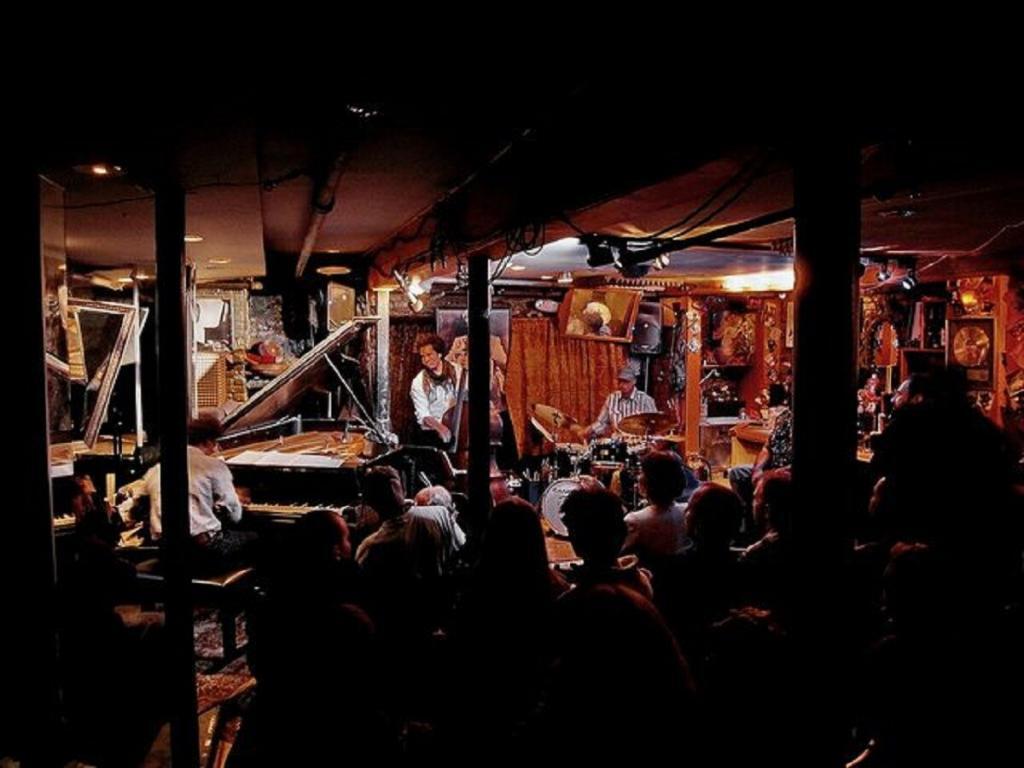Do you guys know that old joke: How do end up with a million dollars in the music business?…
Start with 2 million and open a jazz club.
Of course, any good joke has a grain of truth to it…and running a jazz club sure is no joke. Only a certain breed of jazz devotee is able to assemble the right balance of nerve, dedication, and insanity to run their own jazz club.
If you’ve ever been curious about what it takes, let me walk you through the steps with the Professor’s guide to opening your own jazz club:
To begin with, don’t jump straight into buying your own space. It’s a less risky start to adopt some time in someone else’s. For some odd reason (that’s beyond me) it’s important that you find a space that has absolutely no relationship to music, with zero atmosphere, and put on jazz afternoons there.
Here are some prime examples:
-Masonic Halls
-Retirement homes
-Golf Clubs
Also, make sure you host your jazz afternoons at seemingly random times…let’s say, the third Sunday of the month, or every second Tuesday except in July. Or you could get creative: how about every third lunar cycle of the summer solstice except for the Chinese leap year. Having a confusingly complex calendar will ensure a tiny, confused but loyal crowd.
If you find that adopting someone else’s space hasn’t sent you broke yet, then you’re ready for the next step: opening your very own jazz club!
Firstly, find the right space for your club. Location is very important. You need to find a place that will be impossible for your patrons to find. There is one simple reason to this: nobody likes jazz. There is no point having it on a main thoroughfare, because no-one will go inside. You want your audience to feel like finding your club is a badge of honor, because nobody has heard of it and certainly nobody knows how to get there.
Here are some good rules of thumb for choosing your location:
-No foot traffic
-Dangerous parts of town
-Dark alleys
-industrial zones
-Any place that looks like you could get mugged.
Try and make the club in a downstairs location. This will make it easy for people to enter, and hard to leave—which is especially useful if they don’t like jazz.
Make sure your club very “exclusive” (i.e., small). A 10 person capacity is ideal. That way if 10 people turn up, you can post on social media about your “sellout” crowds.
It’s also important to choose a small room that is a fire hazard, with only one tiny/entrance exit. (If there is a second fire exit, block it with a trash can.) This, coupled with the questionable sanitation of your food, will add a lurking element of danger to your venue. This “will we get out alive?” sensation will add to the excitement of being there, because the jazz music will of course get boring after a while.
Employ low lighting. This will enable you to serve sub-par cuisine (see above) at an outrageous markup, about which they will be none the wiser, because they won’t be able to see what they’re eating. And low lighting has the added bonus of concealing the club’s steadily advancing state of disrepair.
And, of course, you will need to name your club. Keep the name vague. It’s cool not to mention music in the title, or even the fact that it’s a jazz club. (Remember, let’s keep our patrons confused.) Some inspiring examples: Spotted Cat, Smalls, 55 Bar, Ronnie Scott’s, Blue Whale… genius!
If you follow the above steps, then congratulations, your club is sure to be a success! Let me be clear though, “success” in this case means not having to foreclose on your house to pay the club’s debt.
And if you end up going broke, congratulations! You’ve joined the long hallowed list of the club owners of jazz history. And, be satisfied with the knowledge that those club owners who are actually making money are just “selling out” for the tourists. You my friend, were, for a brief shining moment, the real deal.
Oh, and don’t forget to hire my band. We could use the work.
Reedman extraordinaire Adrian Cunningham is the leader of Professor Cunningham and his Old School Jazz Band, based in New York City. Adrian Cunningham was voted in a 2017 Hot House Jazz Magazine readers’ poll the Best Alto Sax Player in New York. His most recent album is Duologue, issued on the Arbors Jazz label. Visit him on the world wide web: www.adriancunningham.com.






















